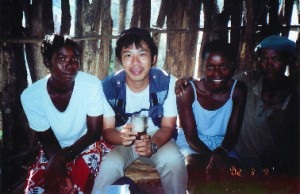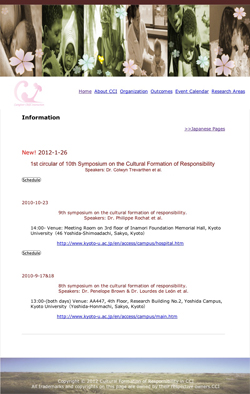Takada’s CCI Plan
Changes in the Participation Framework of Caregiver–child Interactions
Akira Takada
(Graduate School of Asian and African Area Studies, Kyoto University)

Abstract
This project aims to clarify the system by which culture contributes to the formation of responsibility. My approach is based on the concept that both child and caretaker develop responsibility gradually, according to the ability of each to respond during interactions. I will collect and analyze data on the following three themes, focusing primarily on pregnant women and one-year-old children.
The ways in which pregnancy changes the participation framework of the family. It is plausible that pregnancy would induce changes in the participation framework involving the pregnant woman and her family members. I will examine the process by which the child (fetus) is granted the status of a new family member by analyzing interactions between the pregnant woman and her family members. In particular, I will explicate how family members make use of the movements of the fetus and the pregnancy-induced physical/psychological changes of the woman as the basis for interactions.
Developmental transitions in terms of give-and-take activities.
This study examines how one-year-old children give and take things (e.g., food) in their daily activities. During the course of give-and-take activities, participants repetitively act on each other (i.e., giving the thing) and are acted on by the other (i.e., receiving the thing). In other words, children need to show agency as well as to interpret the agency of others to successfully engage in give-and-take activities. Therefore, I will analyze the developmental transitions characterizing give-and-take activities in terms of changes in sequential organization, focusing on the process whereby children become able to interpret these actions appropriately.
Sequential organization of imitative activity.
Focusing on the psychological experiment on imitation by one-year-old children (cf., Tomasello, 1999), I will discuss how the activity of imitation is organized during the course of interactions. Breaking down the activity of imitation into a series of actions such as (a) imitatable action, (b) act of imitation, and (c) assessment of the act of imitation, I will compare successful and unsuccessful cases of imitative activities, thereby analyzing how children use a variety of semiotic resources to act appropriately during the course of imitative activities.
Reference
- Tomasello, Michael. 1999. The Cultural origins of human cognition. Cambridge, MA: Harvard University Press.
Takada Lab website (in Japanese)
http://jambo.africa.kyoto-u.ac.jp/africa_division/kyoin/takada01.html

